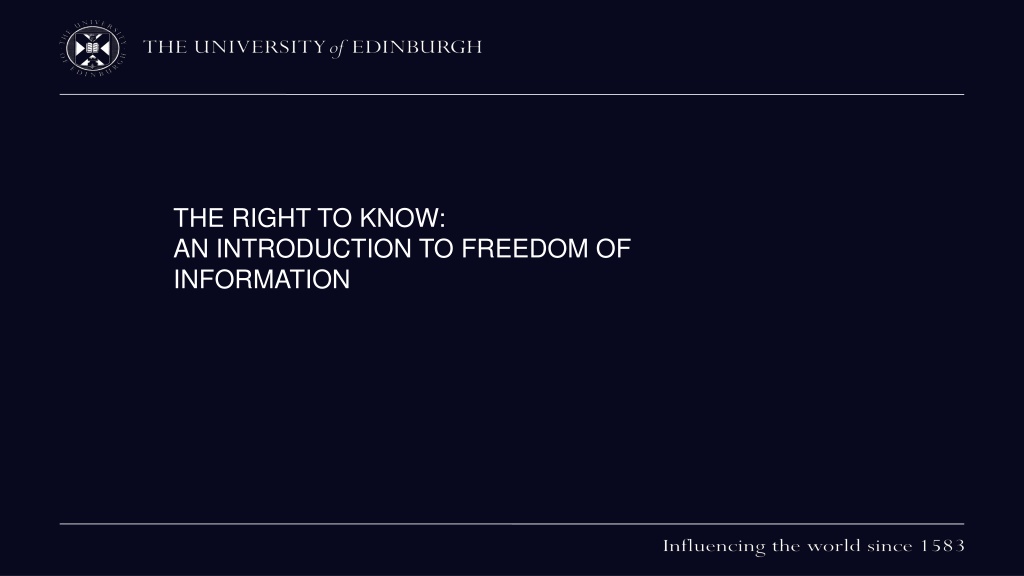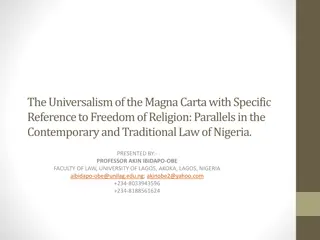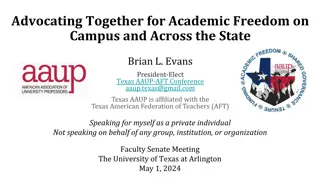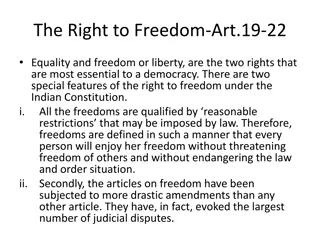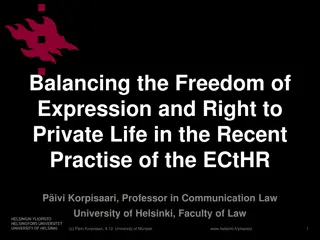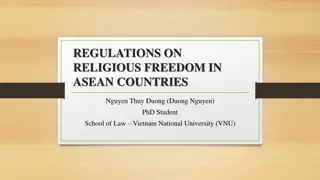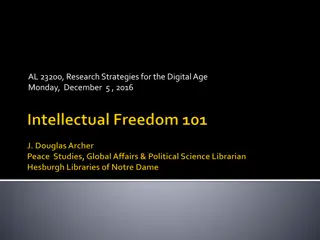Introduction to Freedom of Information
Principles and impact of Freedom of Information laws globally, highlighting the importance of transparency, accountability, and good governance in modern societies. Learn about proactive publication, principal requirements, and the global context of FOI laws
Download Presentation

Please find below an Image/Link to download the presentation.
The content on the website is provided AS IS for your information and personal use only. It may not be sold, licensed, or shared on other websites without obtaining consent from the author.If you encounter any issues during the download, it is possible that the publisher has removed the file from their server.
You are allowed to download the files provided on this website for personal or commercial use, subject to the condition that they are used lawfully. All files are the property of their respective owners.
The content on the website is provided AS IS for your information and personal use only. It may not be sold, licensed, or shared on other websites without obtaining consent from the author.
E N D
Presentation Transcript
THE RIGHT TO KNOW: AN INTRODUCTION TO FREEDOM OF INFORMATION
Background Protects rights and supports: Accountability Transparency Trust Public debate Good practice Good institutional governance Good information management Openness is central to a modern, mature and democratic society. Scottish Executive, An Open Scotland, 1999 A person who requests information from a Scottish public authority which holds it is entitled to be given it by the authority Freedom of Information (Scotland) Act 2002, Section 1(1)
International context Countries with FOI laws 1766 Sweden 1966 USA 1970s Denmark, Norway, Holland, France 1980s Australia, Canada, New Zealand, Colombia, Greece 1990s Italy, Hungary, Spain, Ukraine, Belgium, Iceland, Ireland, Thailand, Uzbekistan, Israel, Korea, Latvia, Albania, Japan, Czech Republic, Georgia, Trinidad & Tobago 2000+ Estonia, UK, Lithuania, Moldova, Slovakia, South Africa, Poland, Romania, Mexico Banisar, David, National Right to Information Laws, Regulations and Initiatives 2015 (December 1, 2015). Available at SSRN: https://papers.ssrn.com/sol3/papers.cfm?abstract_id=1857498
Principal requirements Number of requests received 800 Proactive publication E.g. senior staff expenses, admissions statistics, Court and Senate papers, University policies and procedures Individual requests Popular topics: expenses, salaries, finance/investments, student population and conduct Records management Helps to find information 700 600 500 400 300 200 100 0 2005 2006 2007 2008 2009 2010 2011 2012 2013 2014 2015 2016 2017 2018 2019 2020 2021
Proactive publication Publication scheme requirement to publish (usually on the Internet): Certain types of information Publication timescales Any associated charges Through the University s Guide to Information http://www.ed.ac.uk/about/website/freedom-information Proactively published information qualifies for an exemption Must publish in line with obligations Must keep the Guide up to date
Information to proactively publish Privacy notices (how we use personal information) Retention schedules (especially for personal information) Environmental policies, plans and programmes Environmental impact studies Consider publishing any regularly requested information
Recognising requests Someone (anyone from anywhere) Asks any member of staff For any recorded information held by the University (incl. info UoE doesn t own ) May or may not cite FOI / DP / EIR Received in any recorded format E.g. email, Facebook, Twitter, MP3, MP4 Could be part of wider correspondence Check junk mail and clutter folders Received by you; received by the University Out of office etiquette
Responsibilities Any member of staff: Replying to business as usual and requests to answer locally Assisting with requests for information you hold, incl. making it accessible to colleagues Information Practitioners: Local source of advice, expertise and liaison with the Records Management Section Local systems, procedures and awareness raising Business units: Answering requests for information generated by their activities Managing information in accordance with University Records Management Policy Records Management Section Policy, procedures, guidance, training Co-ordination of complex and/or wide-ranging requests
Responding to requests Business as usual requests In all cases: Maximum of 20 working days to respond Cannot ask why the applicant has made the request Duty to provide advice and assistance Can only check their identity if they have requested information about themselves Follow the University request handling procedures
Requests to answer locally If all of the following apply, use the templates to acknowledge and reply: Your unit can provide all the requested information without any concern Your unit can provide all of the requested information within no more than one day s work If the applicant has asked for information about themselves, you are confident of their identity The request falls entirely within your remit and job responsibilities The request is clear and you understand what is wanted Your business unit owns the requested information Your unit can answer the request in full to the applicant s complete satisfaction without outside assistance
Disclosing information safely Beware hidden data Always Inspect document Remove information that should not be disclosed ICO guidance: How to disclose information safely Beware low numbers Fewer than 5 approach Standard explanatory paragraph
When to contact your local Information Practitioner If a request meets any of the following criteria, contact your local Information Practitioner ASAP: Involves information from more than one area of the University Is from: journalists, NUS, TU, MPs, MSPs Is about: admissions, contracts, controversial research, E&D issues, Royal household, Security Services, VIPs Involves info about/from external third parties Involves personal information Is estimated to take more than one day s work You want to withhold some or all of the requested information You need/want advice
Requests for personal information Subject access requests (SARs) under data protection law: For information the University holds about the individual making the request E.g. Exam board minutes, references, personal file, etc. If answering is within your remit and you have no concerns, follow the University procedures for dealing with subject access requests Otherwise, contact your local Information Practitioner The Records Management Section co-ordinates complex requests and those spanning more than one area of the University
Can I refuse the request? Exemptions: Information otherwise accessible Research information Commercial interests (FOI requests only) Actionable breach of confidence Legal advice Breach of the data protection principles Effective conduct of public affairs (FOI requests only) Negotiations / management planning (SARs only) Not exemptions: I don t like the applicant I don t trust the applicant I m too busy I don t know I can t find the information easily It s embarrassing It looks bad It is bad All exemptions are specific, narrow and subject to tests Contact the Records Management Section for assistance applying exemptions
What does this mean for you? Contact your Information Practitioner if refusing or unsure about a request, or if it does not relate to your area Familiarise yourself with the request handling procedures, and refer to them when necessary 20 working days to respond to requests Create clear and professional work documents Make your work accessible to others
Enforcement Individuals can complain to: Office of the Scottish Information Commissioner (OSIC) about the handling of their FOI request Office of the Information Commissioner (ICO) about the handling of their SAR Personal criminal offence Destruction of information required for a request Contempt of court
Good records management Helps you to do your job better. Supports ease and efficiency of working because you can find the information you need Protects you and the University by providing evidence of what we have done and why Saves you time by ensuring you can find the information you need easily Reduces costs, particularly those related to physical and server space, by ensuring you don t keep any more records than you have to, and that you know when you can delete or destroy them Provides records on which we can rely, both for internal purposes and (if necessary) in a court of law 1. 2. 3. 4. 5.
Advice and assistance Your local Information Practitioner www.ed.ac.uk/records-management/foi-practitioners The Records Management Section www.ed.ac.uk/records-management recordsmanagement@ed.ac.uk
THANK YOU! COMMENTS? QUESTIONS?
